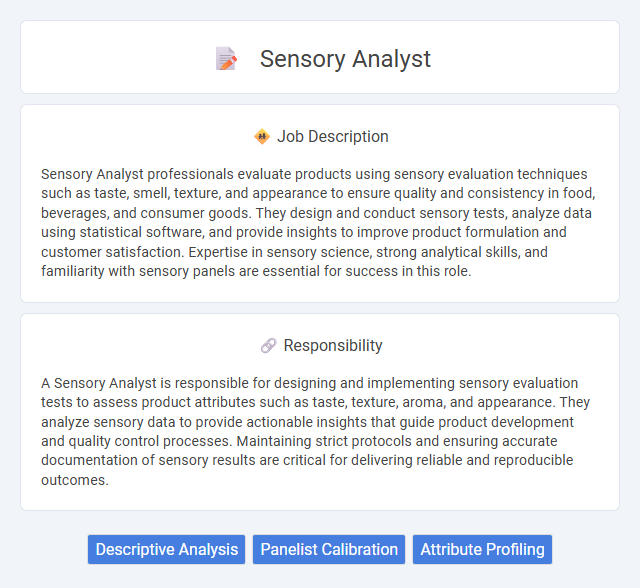
Sensory Analyst professionals evaluate products using sensory evaluation techniques such as taste, smell, texture, and appearance to ensure quality and consistency in food, beverages, and consumer goods. They design and conduct sensory tests, analyze data using statistical software, and provide insights to improve product formulation and customer satisfaction. Expertise in sensory science, strong analytical skills, and familiarity with sensory panels are essential for success in this role.
Individuals with a strong ability to distinguish subtle differences in taste, smell, texture, and appearance are likely to be well-suited for a sensory analyst role. Those who are highly detail-oriented, patient, and able to maintain consistent focus during repetitive testing may find the job more compatible with their skills and temperament. People prone to sensory overload or difficulty concentrating in controlled environments may face challenges adapting to the requirements of this position.
Qualification
A Sensory Analyst requires a strong background in food science, psychology, or related fields, typically holding a bachelor's or master's degree. Proficiency in sensory evaluation methods, statistical analysis, and data interpretation is essential to accurately assess product attributes and consumer preferences. Experience with sensory testing software and a keen attention to detail enhances the ability to contribute valuable insights to product development teams.
Responsibility
A Sensory Analyst is responsible for designing and implementing sensory evaluation tests to assess product attributes such as taste, texture, aroma, and appearance. They analyze sensory data to provide actionable insights that guide product development and quality control processes. Maintaining strict protocols and ensuring accurate documentation of sensory results are critical for delivering reliable and reproducible outcomes.
Benefit
Sensory Analyst roles likely offer the benefit of enhancing product development through precise sensory evaluation, improving customer satisfaction by aligning products with consumer preferences. This position may provide opportunities to work with cross-functional teams, fostering collaboration between marketing, R&D, and quality control. Additionally, gaining expertise in sensory science could increase career prospects within food, beverage, cosmetics, and other sensory-driven industries.
Challenge
Sensory analysts may frequently encounter the challenge of maintaining consistent and unbiased evaluations while processing complex sensory data. The probability of facing difficulties in differentiating subtle product variations requires advanced training and keen attention to detail. Effective sensory analysis likely demands adapting methodologies to evolving consumer preferences and technological advancements.
Career Advancement
Sensory Analysts gain expertise in evaluating product qualities through taste, smell, and texture, forming a critical foundation for roles in quality assurance and product development. Mastery of sensory evaluation techniques and data analysis unlocks opportunities to lead sensory labs or manage cross-functional teams focused on innovation. Advancing in this career often involves acquiring certifications in sensory science and gaining experience with consumer insight methodologies to drive strategic decisions.
Key Terms
Descriptive Analysis
Sensitivity to product attributes and the ability to objectively evaluate sensory characteristics are crucial for a Sensory Analyst specializing in Descriptive Analysis. This role involves designing and conducting sensory tests, collecting quantitative data on aroma, texture, taste, and appearance, and interpreting results to guide product development and quality control. Proficiency in sensory evaluation techniques and statistical software enhances the accuracy and reliability of descriptive sensory profiles used to optimize consumer satisfaction.
Panelist Calibration
Panelist calibration in sensory analysis ensures consistent and reliable data by aligning panelists' perceptions and evaluations with standardized criteria. This process involves training and assessing individual panelists to minimize variability and enhance the accuracy of sensory testing results. Effective calibration improves the overall quality of product assessments and supports decision-making in product development and quality control.
Attribute Profiling
A Sensory Analyst specializing in Attribute Profiling systematically evaluates product characteristics such as aroma, texture, flavor, and appearance to generate detailed sensory profiles. Using standardized sensory panels and statistical techniques like Principal Component Analysis (PCA), they quantify attributes to support product development, quality control, and consumer research. Their expertise in interpreting sensory data drives innovation and enhances product consistency across batches.
 kuljobs.com
kuljobs.com